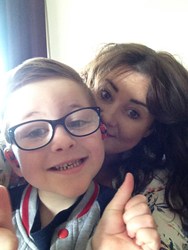How do I... help my deaf child cope with tiredness?
Deaf children are often more prone to tiredness and this can have an effect on behaviour and concentration. Here, four parents share their tips on how to manage tiredness.
My deaf child can be cheeky and grumpy...

Harry and Jenni
Jenni is mum to Harry (5) who has moderate to severe hearing loss and wears hearing aids in both ears.
“As Harry has got older the main effects of tiredness are not paying attention or listening, being cheeky and general grumpiness. He can also be a little over-sensitive and get upset over little things that wouldn’t normally bother him.
After school-related issues were ruled out, I started to think he may just be exhausted after the school day. There’s a boy in his class who often prefers to eat lunch in a quiet classroom and if Harry’s having a bad day he sometimes enjoys eating lunch with him. It gives him a little time out.
One day, on the walk home, he was being really difficult so I told him when we got home he had to go to his room for 10 minutes and think about his behaviour, and it seems to have done the trick! Most days he tells me he’s going to his bedroom for 10–20 minutes to, as he calls it, ‘chill out’. Sometimes he’ll take his hearing aids off, sometimes not. When he’s ready to come downstairs he’s perked right up and is back to his usual happy self. A little bit of time out works wonders for him and it’s made the world of difference to both our lives.
Every child is different, but take note of what times of the day problems are arising and see if there’s a pattern. And I’d definitely recommend some quiet time after a busy day. It’s easy to forget how tiresome a day can be for a deaf child.”
My deaf child can be easily distracted…

Harvey
Samantha is mum to Olivia (13) and Harvey (12). Harvey is profoundly deaf in both ears and has bilateral cochlear implants.
“Harvey’s teachers at primary school noticed he would make clicking noises and other sounds in afternoon lessons. Sometimes he’d engage in silly behaviour and be easily distracted. His Teacher of the Deaf thought it was due to listening fatigue (which can also be referred to as concentration fatigue), with the effort of listening and lip-reading becoming too much for him towards the end of the school day. I researched it and it all made sense: the behaviours were more noticeable in lessons where he wasn’t supported, wasn’t fully engaged or didn’t enjoy as much.
These actions were simply Harvey’s way of staying alert while his brain was frantically trying to fill in the gaps of what he couldn’t hear. Harvey now attends a local mainstream secondary school and has a one-to-one learning support assistant (LSA). Mainstream schools often have limited experience of deafness and may not have heard of listening fatigue and it can be a challenge for parents to educate staff so that their child gets the appropriate level of support.
Harvey now has an Education, Health and Care (EHC) plan which include strategies to bring Harvey’s attention to his noises and behaviours so he can take control and stop them. This usually works but if he continues the LSA can allow him to read for 5–10 minutes or have a short break. They can also take him out of the classroom and continue the lesson somewhere quieter. He attends a really supportive school and is doing really well now.”
My deaf child can get emotional and angry…
Melanie is mum to James (23), Alex (18) and Jack (17). Jack has a fluctuating hearing loss ranging from moderate to profound and wears a hearing aid in his right ear.
“Jack’s hearing impairment got worse three years ago. He went to bed with his usual level of deafness and woke up the next day completely deaf in his left ear. He mainly copes with tiredness by having frequent communication breaks where he takes himself off to his room for some downtime.
Obviously this isn’t possible at school, so he’s particularly tired when he gets home. This makes homework/coursework and/or studying for exams a very stressful time. The stress often then impacts on his general health which has a further impact on his tiredness. When he’s tired he gets very emotional, confrontational and angry.
I help Jack break up his homework and studying into manageable chunks and timetable it with lots of breaks in between. I sit with him while he’s working to help him stay on task but I let him lead the timetabling process so it’s manageable for him. I encourage alone downtime, but I always make sure he knows I’m here for him if he needs to shout, scream, cry or vent his frustrations.”
My deaf child takes her hearing aids out…

Emily
Lucy is mum to Edward (12) and Emily (9). Emily has moderate to severe hearing loss, wears hearing aids and uses a radio aid and a soundfield system.
“Emily is always tired, especially on school days, so we limit after-school activities. Days out are planned in advance and quiet time is factored in.
Sometimes she wants to take her hearing aids off and not do anything. More often she becomes emotional, frustrated and hates deafness. Let your child have a break from their hearing aids when they choose. This shows them that they are in control, not their deafness. If your child doesn’t like too much noise check your holiday destination – once we made the mistake of going to a seaside that was too noisy and Emily became exhausted.
Tell them it’s okay to be tired and if they become frustrated stop whatever you were doing, hug them and ask what makes them feel that way. Let them take out their frustration on bubble wrap or rip up paper with them and soon the frustration may turn into laughter.”
